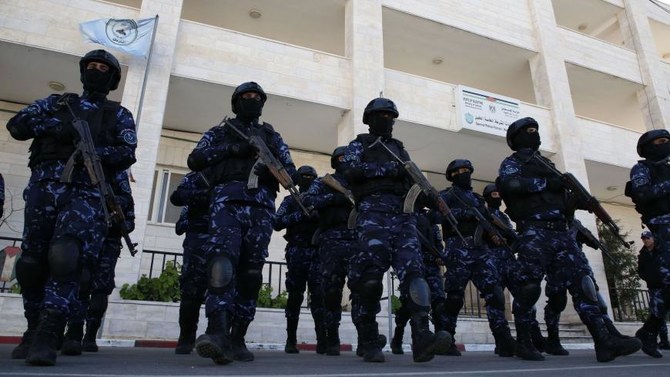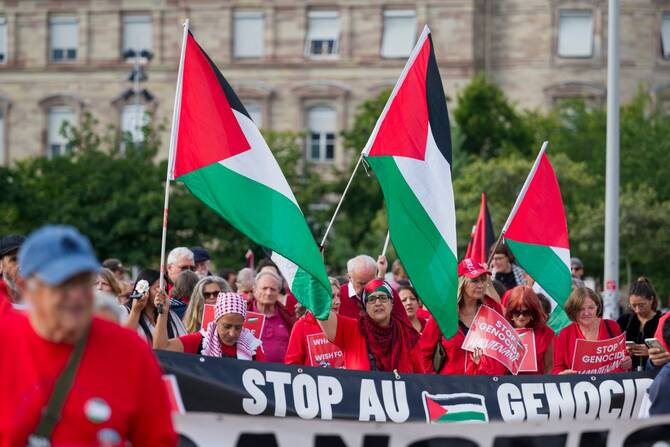The emergency step taken by police chief Maj. Gen. Youssef Al-Hillew came hours after the Palestine National Bank’s Aqraba branch, south of Nablus, was targeted by gunmen on Wednesday.
A four-strong gang armed with pistols and a homemade Carlo gun, got away with $17,500.
Saeed Abu Rashid Al-Amouri, the bank’s director, told Arab News:
“While I was sitting in my office, the bank security guard ran in and told me that the branch was being robbed.
“I saw four thieves, two armed with pistols, one with a rifle, and the fourth without a weapon, entering the branch with their guns raised.
“I pressed the emergency button linked to the Nablus police operations center and the central administration of the bank in Ramallah three times, which signals a robbery is in progress that they could watch via security cameras.
“I went out and found the thieves in front of me asking about the cash. I directed them toward the safe, and they seized what was inside and left.
“When they left the bank, they fired twice in the air before getting into their car, which had no number plates, and its windows were tinted. The masked thieves were young men.
“The robbery lasted only 40 seconds, and this is the first robbery I’ve witnessed since I started working in banks 20 years ago,” Al-Amouri added.
Following the spate of recent raids, he said his branch had received instructions not to hold more than $20,000 in cash and to transfer any extra cash to a safe, which takes 30 minutes to open.
Al-Amouri noted that until a year ago, the bank’s guard had been armed with a pistol, but management had decided to withdraw light weapons from all 20 branch guards and gift the guns to the Palestinian police.
He added that the stolen money was insured but pointed out that the crime may not have happened had the robbers known the guard was armed.
“The phenomenon of recent robberies has not been solved yet by the Palestinian police, nor have they succeeded in arresting the perpetrators or recovering the stolen money, which is a matter of great concern,” he said.
Meanwhile, the accounts manager of a large gas station company in Ramallah told Arab News that during Eid Al-Fitr he had been unable to deposit cash in the bank due to it being closed. As a result, he and some colleagues had to guard almost $1 million until the bank reopened.
Many Jordanian and Palestinian banks operate in the West Bank and East Jerusalem and Al-Amouri said the Jordanian banks had been instructed not to arm their guards.
In the last days of Ramadan, armed robbers stole 8 kilograms of gold from a store in Al-Dhahiriya, in the southern West Bank. No arrests have so far been reported.
Palestinian police director of public relations and information, Brig. Gen. Zneid Abu Zneid, told Arab News: “Armed robberies like these must have cross-border links. We believe that a number of such robbers carry Israeli identity cards.
“The phenomenon is hazardous. The amount of stolen money doesn’t matter. The most important thing is how the thieves dared to carry out an armed robbery in broad daylight and open fire inside banks, which undermines the prestige of security, police, and law in the country,” he added.
He noted that fears the bank association or Palestinian Monetary Authority may close branches, had prompted the police crackdown.
Samir Hulileh, head of the Palestinian stock exchange, told Arab News: “It is necessary to intensify and guard police patrols around banks, money changers, and gold and diamond shops.”
Palestinian sources told Arab News that Israel prevented bank guards in the West Bank from carrying weapons in case they were used against Israeli targets.
Hulileh warned that if the robberies could not be stopped, they may cause further damage to the already fragile Palestinian economy.
There are 13 Palestinian and 13 Jordanian banks operating in the West Bank with many branches in cities and towns. In addition, there are 450 money exchanges and 450 ATMs, as well as dozens of gold and diamond shops, and gas stations.
“If armed robbers feel the police force is weak to arrest them and produce them before a court of law, the phenomenon will expand further,” Hulileh said.






















